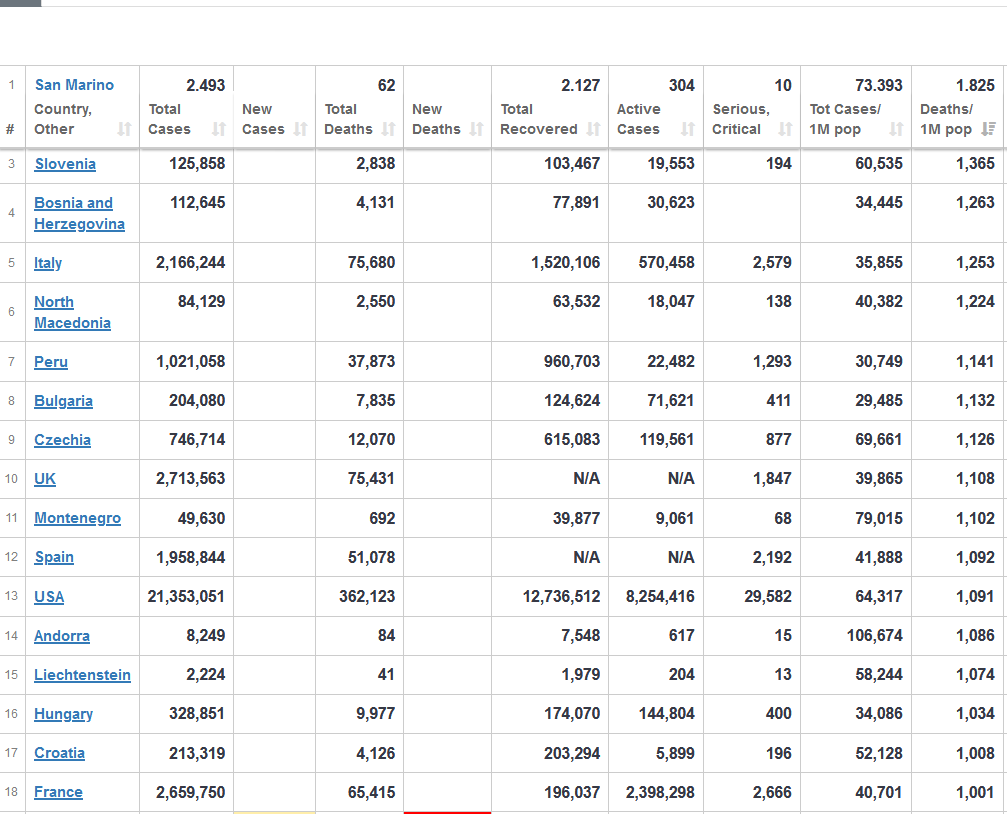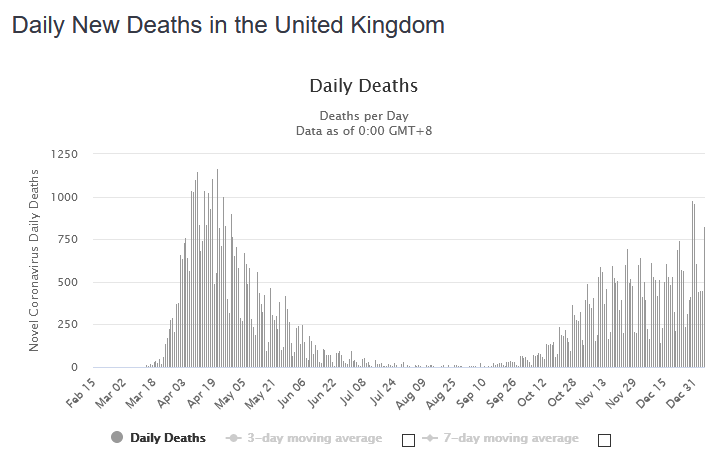
Since we’re in another fairly strict lockdown I had a glance at these figures which relate to all countries of the world. I’ve ordered them by deaths/million population ( the right hand column) since that seems an interesting comparison. Clearly, different countries will have different systems for recording COVID cases and attributing deaths from COVID and so, without knowing the details, we might expect the UK to be quite good, compared say with Mali, at recording cases but we might also expect the UK to have a pretty good health service that might be able to reduce deaths.
You’d want to be at the bottom of this list (which is over a 100 countries off the bottom of the page) through having few cases and/or few deaths from thse cases. We in the UK are ninth highest in the world. And this list of countries is, quite interestingly, dominated by European nations all in the region of 1000 deaths/ million population.
And it’s not as though deaths/day are tumbling at the moment, quite the opposite.

The shape of the deaths/day graphs for different countries are interesting. Since you probably aren’t going anywhere (are you?) then take a look at them. We are all in it together, across the planet.
Stay safe! And behave so that you keep others safe too, please.
[registration_form]
It is difficult not to be sceptical about the death rates claimed for some countries – as you suggest some poorly developed countries may not have very effective systems for capturing the information (and some governments may be less than completely honest). Having said that there are some striking differences between countries where there should be a reasonable expectation of accurate monitoring. How is it, for example, that Germany has managed to keep its death rate at less than half that of the UK and other countries in the 1000/million bracket and substantially lower than all of its neighbours apart from Denmark?
There are doubtless many factors affecting the death rates recorded for each country, including the methods used to calculate them, the effectiveness of the response to the pandemic by the governments concerned, demographics, social and economic factors and probably more. One does not get the feeling that the UK governments have managed the crisis particularly well but there is a substantial amount of analysis to be done before we can confidently point to the reasons why we find ourselves in the wrong part of the league table.
How on earth do they monitor figures in a country such as India. Can they? And how can they be reliable? Deaths per million are exceedingly low for people that live on top of one another with no access to health care.
This is interesting but the only thing we sensible folk can do is to try to avoid being on the table at all. I haven’t been anywhere really since last March no visits to North Yorkshire to see family and friends, no holidays anywhere and only half a dozen trips relatively locally in the summer looking at wildlife. I won’t say I’ve enjoyed this enforced localisation, but there have been benefits in terms of knowledge and enjoyment of local wildlife but it has been the right thing to do. I’m of an age where the risks are higher and I have “underlying health issues” so I’ve clicked and collected much of my shopping, masked up at all face to face meetings with collecting or shopping, it may be a bore but it is necessary. The only thing we can do is be relatively anti-social and masked in any face to face, keep in contact with friends over the net, we are powerless to do much of anything else. I don’t want to be part of those stats, nor do I want friends and loved ones to be so either. The vaccines will beat it in the end, the vacillating, in some cases lying and useless politicians won’t. Be safe for yourself and all those around you.
The most important thing is -Behave yourself ,follow the rules.
You’re not special and can’t justify breaking them.
Happy New Year
and possibly don’t go to San Marino!
Surely you have to cf deaths to the size of the at risk group in a country not just pop, it is probably a more important comparison than the quality of the health service.
I would guess that our at risk proportion of the pop of over 80s is massive cf Mali. Where by the way there is a great little charity the Joliba Trust that I have supported over the years. It is a textbook of how a farming systems charity can work in the Sahel, with dune stabilisation and tree planting among all the other social issues. The Sahel is where a lot of our birds pass through. Since you have time look them up.
Too many factors involved to be able to draw any meaningful conclusions at this stage eg what’s the age profiles of each country’s population, when did the virus first appear in each country.
It will be years before the dust as settled enough to be able to make sense of it all.
Ref Germany They follow the rules.
A relative working there was impessed how they have rules like no power tools in the garden on Sunday and non in the house in the eveing and they stick to them.
IIRC in a block of flats in Germany you can’t flush a lavatory at night.
Befehl ist Befehl
As much as I enjoy Filbert’s posts (and I do) I get fed up when any reference to Germany doing anything sensible is immediately
answered with a reference to the Nazis.
As my old boss used to say “There’s a difference between scratching your arse and pulling the hairs out”
They started it
Interestingly, nowadays German soldiers are no longer required to obey orders in all circumstances.
https://www.history.com/news/why-german-soldiers-dont-have-to-obey-orders#:~:text=The%20country's%20military%20is%20disobedient%20by%20design.&text=However%2C%20the%20German%20military%20manual,it%20must%20not%20be%20obeyed.
“I was just obeying orders” would not be accepted as a legitimate defence nowadays.
I liked this: https://unherd.com/2021/01/amid-covid-crisis-we-cant-wait-for-perfect-data/
I agree that governments have to take decisions in the here and now and cannot afford to wait for “the science” to be fully settled. In assessing how well the crisis has been managed it will admissible to enter that in mitigation for mistakes that were made (but can’t excuse any and every mistake made). In due course it will be important to try to tease apart the various factors that led to varying mortality rates in different countries so that (a) we can learn potentially valuable lessons that may help us face future pandemics and (b) to the extent that it is reasonable, we can hold the authorities accountable for their performance.